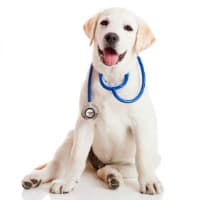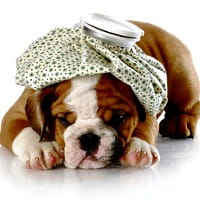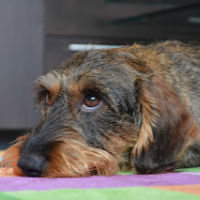FYI: If you buy something through a link on this site I may earn a commission - at NO extra cost to you.
About Canine Parvovirus
What you need to know:
- Canine Parvovirus is a highly contagious & absolutely deadly viral disease that affects dogs, especially puppies.
- It's most common victims are young puppies who have not been fully vaccinated.
- Most un-vaccinated puppies who catch Parvo will die without prompt and comprehensive veterinary care. The mortality rate for this virus is high.
BUT here's the good news:
- With early detection and immediate veterinary care it is possible for a pup to recover - although there are no guarantees (somewhere between 10% and 15% of puppies still die, even with treatment).
- Early detection and prompt treatment can make the difference between life and death for your puppy.
- A
full course of puppy shots can give your pup strong protection and
immunity from Parvo.
Please take the time to read the information on this page because it could mean the difference between life and death. I'm not exaggerating, I've seen Parvo in action and it can be devastating.
There is no time to 'wait-and-see' when it comes to this disease.
- Symptoms of Parvo
- How is Parvovirus Transmitted?
- Canine Parvovirus Treatment
- Aftercare for Puppies Who Had Parvo
- Parvovirus Prevention
Symptoms Of Canine Parvovirus
The most common symptoms of Parvo in include:
- Diarrhea - Severe, watery or bloody diarrhea is the most obvious sign of parvovirus. This type of diarrhea is difficult to miss as it's explosive, foul smelling and frequent. It may be very dark in color, almost black, or thin and watery with visible blood,. Any blood in the diarrhea should be cause for emergency vet attention. There are other, less serious possibilities, but never take a chance on it being something else. Get a diagnosis right away.
- Vomiting - Severe, repeated vomiting is the second most common symptom of parvo. If your pup vomits over and over again and is unable to even keep water down, he's in danger of becoming dehydrated very quickly. In a young puppy the dehydration itself can be serious enough to cause major health problems, even death. It's this total dehydration that is responsible for the death of many parvo puppies.
- Fever - Puppies with canine parvovirus will usually run a fever of 103 - 104F or higher. It may not happen immediately though.
- Lethargy - Extreme lethargy (tiredness), a total disinterest in their surroundings and complete lack of appetite are all classic symptoms of parvo. Of course, lethargy is often present in other diseases or illnesses, but if it's coupled with any of the above symptoms, canine parvovirus should be seriously considered.
All of these symptoms can also appear in other illnesses, and it's not possible to diagnose Parvo on the basis of symptoms alone.
The only way to know for sure if Canine Parvovirus is what's making your pup sick is to have your veterinarian run some tests.
A fecal test (when your vet tests a sample of your puppy's feces for the virus) is often used, and a blood serum test is also available.
Both of these tests can give provide a quick answer, but they can also show 'false negatives' (ie no virus shows up in the tested sample).
This type of test can also show a 'false positive' if your pup has been vaccinated with the live vaccine within the previous 2 weeks, so it's important to let your vet know when his last vaccinations were given.
There are different strains of canine parvovirus
First seen in the late 1960's, scientists and researchers are aware that different strains of Parvo are constantly evolving and emerging. Each one can affect a puppy differently.
Strains which have a cardiac component can cause sudden death by heart attack/heart failure, usually totally unexpectedly, and sometimes in a puppy who seems to be recovering from the initial symptoms. This is most often seen in very young puppies.
Fairly recently a new strain (CPV-C2)was discovered in the USA, which affects both vaccinated, adult dogs as well as puppies (it also seems to be able to be transmitted to cats).
How Is Parvovirus Transmitted?
Parvo is transmitted through contact with the feces of an infected dog.
Canine Parvovirus is HIGHLY CONTAGIOUS, just one stool contains millions of live virus cells and can infect many dogs/puppies.
The virus can be found in the stools of infected puppies several days before any symptoms show up, and for at least 2 weeks after a puppy has completely recovered.
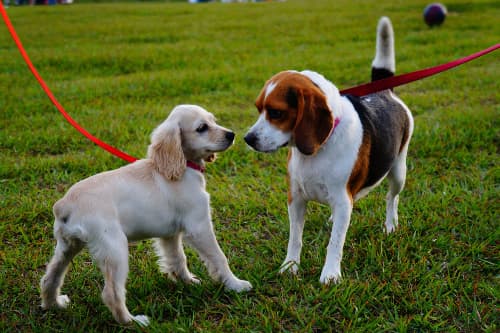
- If your puppy licks or eats the stools of a pup/dog who has Parvo then he's going to be infected as well.
- For example if he gets just a little feces on his paws or coat, and then cleans them by licking, he's going to get sick.
- If you get some of the virus on your hands, shoes or clothing and then your pup comes in contact with them, he's going to get sick.
- If he sniffs or licks a dog who's been infected, chances are he's going to get sick.
YOU need to be extra careful too.
Don't wear your outdoor shoes inside the house and wash your hands carefully after being in contact with other dogs.
Other animals can unintentionally spread Parvo too. If you live in the country you need to be aware of this because birds and small mammals can carry the virus on their paws and track it through your yard.
If your pup survives Parvo, he remains infectious for at least two weeks after being pronounced fully recovered. It's very important to keep him isolated at home and away from other pups/dogs for at least two weeks, preferably three during this time.
Canine Parvovirus Treatment
Because Parvo is a virus, it can't be cured with antibiotics, but antibiotics are often used to treat the secondary infections that usually go hand-in-hand with this disease.
The main treatment for canine parvovirus is hospitalization where your pup/dog can get...
- Rest
- IV fluids to combat dehydration
- IV antibiotics to treat any secondary infections
This is called 'supportive care'.
Statistics show that around 80% of puppies will die from Parvo if they're not treated quickly, this type of care is absolutely essential and gives your puppy the best possible chance of survival.
It's vitally important to get the treatment started right away, that's why any puppy who's showing sudden onset symptoms of diarrhea and/or vomiting and who seems lethargic or disinterested in food or his surroundings, needs to be seen by a vet IMMEDIATELY.
Even a 24 hour delay wait could be deadly.
New/additional treatment options......
Tamiflu
The anti-viral drug Tamiflu has shown promise when given to puppies/dogs who are showing early symptoms of Parvo.
It's not a 'cure' but given early enough (as soon as possible after onset of symptoms) it can help prevent the virus from multiplying and getting stronger.
Also, if given to pup who have been exposed to Parvo but aren't showing symptoms yet, it MAY prevent onset, or make it less severe.
If your puppy or dog has been exposed to Parvo, or is diagnosed with it, definitely ask your vet about Tamiflu.
It can't hurt and it just might help!
Plasma Transfusions
One of the newer, 'cutting edge' treatments currently being used (and studied) for Canine Parvovirus is a Plasma transfusion.
Blood plasma is rich in proteins, many of which are great healers. It also boosts blood volume (often lost through dehydration) and increases the white blood cell count (white blood cells fight infection).
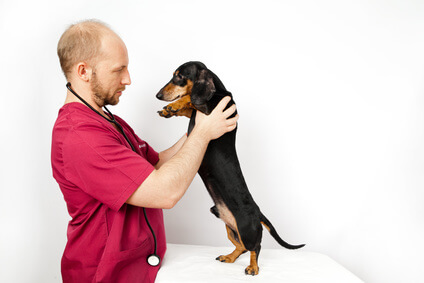
Individual puppies can react quite differently to this disease,
and although early diagnosis and treatment is vital, it's not a
guarantee of recovery.
The most acute phase of the illness usually lasts somewhere between 7 and 14 days, and if a puppy survives this long he has a good chance of making a full recovery.
Some puppies get extremely sick, for what feels like an extended period of time, then recover. Others get sick quickly, and die quickly. Some appear to be recovering and then relapse, possibly even dying.
It's exhausting and gut wrenching for both puppy and owner, but with prompt and full veterinary care most puppies DO get through that critical period and then slowly regain their strength and start on the path back to normal life.
It's not always the biggest 'strongest' puppies that win the battle either, you simply can't tell by looking.
Veterinary diagnosis and care isn't just an option with Parvo, it's an absolute necessity.
Aftercare For Puppies Who Have Had Parvo
Although your little one may have survived the disease itself, he will probably look a very sorry sight when you get him home.
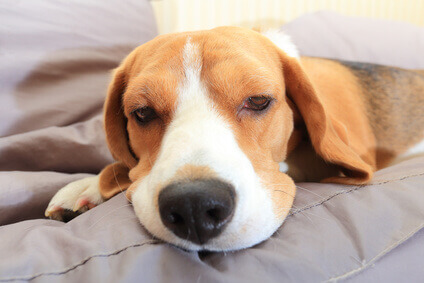
Puppies who have had to fight parvo often lose most of their body fat, which means their head
and paws look much too big for their frame.
Your puppies eyes may still be dull, and he may still have little appetite. He'll definitely be tired and need plenty of rest.
This can be quite frightening, but it's perfectly normal. He's been through an ordeal and needs time to rest and recover.
Here's what you can do to help:
- Give him plenty of chance to sleep and rest, that's how his body will repair itself.
- Don't worry too much about his appetite, offer good nutritious food and let him eat what he wants. His appetite will come back as he starts to feel better.
- Do make sure he gets plenty of water, and you can even add unflavored Pedialyte to his water if he'll drink it.
In spite of his initial condition, you'll be surprised how quickly your puppy will 'bounce back', and within a few weeks his little body will start to fill out, his appetite and strength will return and soon he'll be his old self again.
Most likely he'll also usually have a life-long immunity to canine parvovirus.
But please remember that he will still be at risk of transmitting the virus to other dogs for two to three weeks after being pronounced 'recovered'.
During this time it's important to keep little Fido away from other dogs or puppies so they don't get sick too.
Puppy owner's personal Parvo experience
I recently got an email from a visitor to my site, Dawn, who has had her own experience with Parvo.
She wanted to share this information with other puppy parents in the hopes that it might help them help their puppies after parvo.
'We had two puppies get parvo.
Six from the same litter got it and the 3 that received veterinary attention survived, the 3 that didn't, died.
Our 2 survived but a few months later both of them got demodectic mange, which I understand is an immune problem.
My feeling is that the amount of antibiotics they took to combat the parvo - which is what saved them - led to the mange.
So we got them treated for that, but I also started feeding them yogurt very day with the idea of increasing the levels of good bacteria in their intestinal tract.
In humans it's believed that low levels of good bacterial lead to immune problems, so why not dogs too?
Luckily both our puppies are fine now, but if I ever had a puppy get canine parvovirus again I would feed yogurt for several months after they return from the vets.
I think Dawn has a very good point there, and after a battle with Parvo a puppy certainly needs all the help he can get. Anything that can help rebuild his immune system has got to be a plus.
A pro-biotic product especially designed for dogs and cats such as Only Natural Pet Probiotic Blend is another excellent way to help restore the balance of microbes in your pets' digestive system.
Thanks Dawn for taking the time to share your experience! Much appreciated.
Decontamination & Disinfection
It's important to know that the parvo virus itself is extremely hardy and difficult to 'kill'. It can live on multiple surfaces and in the ground for a long period of time.
outdoors
When in the soil, canine parvovirus is not dramatically affected by heat, rain, cold, frost or any other climatic condition.
If the ground is frozen it basically puts the virus into a 'dormant' state and when the ground thaws there is still a risk of contamination.
If you don't treat/disinfect the ground, this is what you can expect....
Areas in direct sunlight - contamination lasts approx. 6 months, but could be longer
Areas in shade - contamination lasts approx. 8 months to 1 year
indoors
Parvovirus becomes inactive much more quickly indoors than it does outside.
Normally contamination will last for approximately 1 - 3 months inside your home.
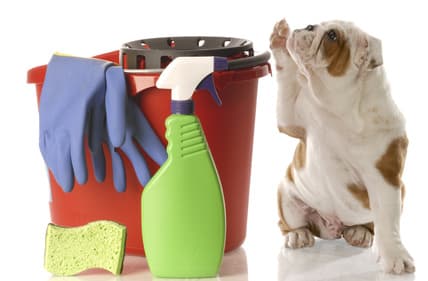
The most effective way to kill parvovirus is with a 1:20 solution of bleach and water.
Obviously, if your pup has had Parvo and survived, he's no longer at risk from the re-contamination but other un-vaccinated dogs and puppies could easily become infected if they come into contact with the live virus in the ground.
Although it's impossible to say that anything will completely destroy parvo-virus, the most effective decontamination method is to use a solution of household bleach and water.
You can clean everything - floors, toys, walls, crates etc. - with a bleach/water solution (a 1:30 solution is often suggested, personally I would tend to make it a little stronger, perhaps 1:20).
It's important to make sure the bleach/water solution remains on the surfaces/objects that you're cleaning for at least 20 minutes.
Soak bowls, toys, mats and so on in the solution if possible, or at least wipe over thoroughly and don't dry off right away. You can rinse and dry them after the 20 minutes is up.
You can also spray or soak the ground outside with this same strength solution and use it to clean any concrete/asphalt areas your puppy may have used.
Although it's not practical for many surfaces/objects, steam-cleaning is a
form of sterilization that will deactivate the parvo virus.
It's always a good idea to steam clean carpets if you've had an infected puppy in the home. The fibers in carpets can trap traces of the virus which may remain active for several months.
Steam-cleaning or sterilizing bowls, toys etc. is also pretty easy, especially if you have a steam sterilizer for baby bottles or something similar.
Canine Parvovirus Prevention
There are two ways that you can protect your pup from catching Parvovirus , used together they give little Fido the best chance of staying safe and healthy.
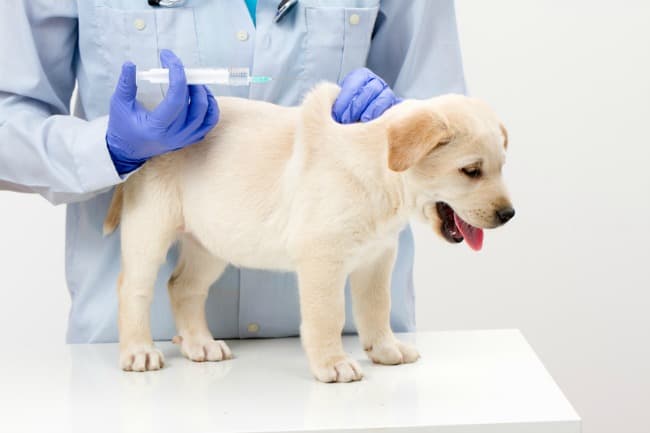
- Make sure your puppy gets all his vaccinations on time, and gets the full 3 sets of shots. Some breeds are especially vulnerable to parvo (including Rottweilers, Doberman Pinschers and Pitbulls) and they need an additional, fourth, parvo shot at approx. 16 weeks of age.
- Keep your pup away from other puppies, dogs and public places until he's had all his vaccinations.
Getting the proper vaccinations, at the right time, is the #1 best way to protect your puppy from Parvo.
A full series of shots (usually three) need to be given before your puppy is fully protected.
It's also good to remember that immunity doesn't happen the instant that third shot is given. It's a good idea to wait at least 48 hours before taking your pup out and about, just to be safe.
Here's a heart-felt warning from a devastated dog owner who lost a litter of 7 week old puppies, and their momma, to Parvo....
'My son just lost his dog, and her litter of puppies, to Parvovirus. We took them all to the vet just as soon as we noticed that the mom wasn't well... but it was too late, and that was within a 24 hour period. One minute they were fine, the next.... well, it's a very sad day here. I urge everybody, PLEASE vaccinate your furbabies! It will certainly reduce the risk of suffering the heartbreak we are going through now.'
you might also like...
- Home
- Illnesses & Disease
- Canine Parvovirus
FTC Disclosure: Some pages on this site contain affiliate links. I may earn on qualified purchases.
